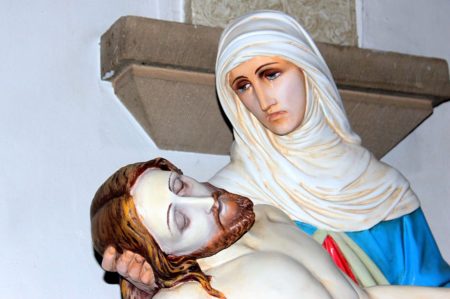Podcast: Play in new window | Download
Subscribe: Spotify | Email | RSS
This and the previous episode are based on my conviction that in weighing competing speculations, we must go by more than creativity and seeming coherence. We ought, in my view, to also consider their fit or misfit with common sense, with truths which should be obvious to just about anyone.
 Over many years of studying and weighing various theories about the Trinity and the Incarnation, a number of obvious truths have jumped out at me, truths which conflict with various theories. Indeed, especially philosophically trained partisans of Trinity or Incarnations will frequently wield one or more of these against the rival theories. Everyone likes “human” reason, when it’s not trying to turn their own sacred cow into hamburger.
Over many years of studying and weighing various theories about the Trinity and the Incarnation, a number of obvious truths have jumped out at me, truths which conflict with various theories. Indeed, especially philosophically trained partisans of Trinity or Incarnations will frequently wield one or more of these against the rival theories. Everyone likes “human” reason, when it’s not trying to turn their own sacred cow into hamburger.
I would say to many such objectors: “Well said. But, let’s also consider these other truths, which are epistemically on a par with the one you just used to dismember, e.g. some social Trinity theory or some “Latin” theory.”
Moreover, if these really are evident to any normal adult who is unprejudiced and who has had the requisite common experiences, then we can bring them even to the reading of scripture, for the writers of scripture were humans too.
As I explain in the episode, these are grouped together as they are relevant to various ideas about Trinity and Incarnation: relative identity theories, mystery defenses, two kinds of Incarnation speculations, and “the deity of Christ.”
21. If every F is a G, there are at least as many Gs as Fs.
22. To be a god is to be a certain individual, concrete being/entity.
23. Being the same god requires being the same (individual, concrete) being/entity.
24. If x is the god of y, then x and y are not the same god. (Or: No god is the god over himself. Or: God-of is a non-reflexive relation.)
25. Apparent incoherence is strong evidence of falsehood.
26. Sentences which can’t be understood can’t be believed.
27. The NT writings never present or defend any tripersonal God theology or any two-nature christology as a “mystery.”
28. For any serious written source, charity requires that we try hard to avoid seemingly incoherent interpretations.
29. If x is an ancestor of y, then there was a time when x existed and y did not. (Or: If y is a descendant of x, then there was a time when x existed and y did not.)
30. If x is an ancestor of y, then x is a direct or indirect cause of the existence of y.
31. A human being is within the human lineage, and must therefore be either a first human, or one exists because of the causal actions of one or more previous humans. (Mere human-type present qualities are not enough.)
32. As depicted in all the NT, Jesus is a single self.
33. Mere control of a human body is not enough to make a self human. (e.g. demon possession, soul-switching with an animal)
34. Whatever is conscious, knows, intentionally acts, and is praiseworthy or blameworthy for those acts, is a self. (e.g. “human nature”)

35. God can authorize a human to do what, otherwise, only God would have the right to do.
36. God can empower a human to do what would otherwise be beyond the capacity of any created being.
37. Any being which has died was not, at that time, immortal.
38. Any being which has died, is dying, will die, or might possibly die, is not essentially immortal.
39. This is an invalid argument: x is F, y is F, therefore, x = y.
40. One can honor or dishonor someone indirectly, by honoring or dishonoring their agent.
Do you agree that these are “obvious” truths? Do you agree that they’re truths at all?
Links for this episode:
- This week’s thinking music is “Ruffling Feathers,” by Jesse Spillane.
- “Constitution Trinitarianism: An Appraisal“
- In the New Testament, Jesus has a god (who is also ours)
- “On Positive Mysterianism“
- Clarifying Catholic Christology
- podcast 124 – a challenge to “Jesus is God” apologists
- podcast 143 – Dr. Timothy Pawl’s In Defense of Conciliar Christology – Part 1
- podcast 144 – Dr. Timothy Pawl’s In Defense of Conciliar Christology – Part 2
- podcast 145 – ‘Tis Mystery All: the Immortal dies!
- Who Should Christians Worship?

“24. If x is the god of y, then x and y are not the same god. (Or: No god is the god over himself. Or: God-of is a non-reflexive relation.)”
But this relation is only true of the Word in relation to the Father. It was voluntarily assumed by both parties at the incarnation. In this sense this “god” does not exist before the incarnation.
I don’t see why voluntariness matters – whether voluntary or not, the point is that it is incoherent to suppose that one and the same god is his own god. Now, that the Father is the god over the Son DOES make sense, if they are not the same god. But unfortunately, on some Trinity theories, where they are not the same god, neither is a god, but only the Trinity is! (e.g. W.L. Craig)
But if the Logos in the flesh has two natures isn’t he upholding the existence of his human nature effectively making himself his own God?
Dale asks: “Do you agree that these are “obvious” truths? Do you agree that they’re truths at all?”
In some cases, no. In other cases difficult to say without a context perhaps.
For example 35 to 38 are either not true or not unreservedly true, in my view.
33. Mere control of a human body is not enough to make a self human. (e.g. demon possession, soul-switching with an animal)
The dead saints in heaven have no body to control. Have they ceased to be human?
Thanks for the comments, Paul.
“35. God can authorize a human to do what, otherwise, only God would have the right to do.”
What counterexample(s) did you have in mind here? I can’t think of one.
“38. Any being which has died, is dying, will die, or might possibly die, is not essentially immortal.”
This one is true just by the meaning of “essentially” and “immortal.” “Immortal” means undying, that one can’t die. “Essential” here just means that the feature is one which in principle, one could not lack.
“33. Mere control of a human body is not enough to make a self human. (e.g. demon possession, soul-switching with an animal)”
You object: “The dead saints in heaven have no body to control. Have they ceased to be human?”
33 does not say that one can’t be human without a body to control. What it says is that having a body to control – that by itself is not sufficient to guarantee that one is human. With this clarification, do you now agree with 33?
Thanks Dale for interesting discussion.
re 33, yes I would agree. The capacity to interact with other humans, in a reciprocal manner, would seem to me to be an important requirement. I don’t think the divine Jesus was lacking anything in this respect.
you said ““35. God can authorize a human to do what, otherwise, only God would have the right to do.”
What counterexample(s) did you have in mind here? I can’t think of one.”
Did you actually provide any examples to undergird your assertions? I don’t think so.
That aside I would claim that one on one repentance is the OT way of receiving personal forgiveness and this is continued in the NT. Unitarians make God inconsistent in his dealings with sinners. Introducing a mediating agent in the NT.
36. There is a limit to this empowering beyond which a human cannot go. At this point the human, or other personal entity, is just the visible conduit of God’s power. Beyond this point only God’s power is active.
37-38. In the case of the incarnation dying would be the reversal of that process. There has to be a natural means of reversing the process. Death is this means. As the incarnation did not change the divine nature, neither can it’s reversal.
Comments are closed.